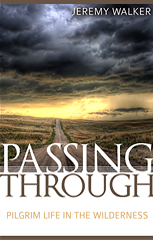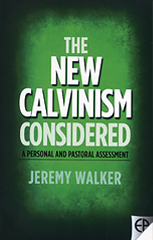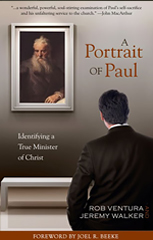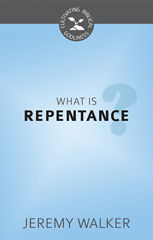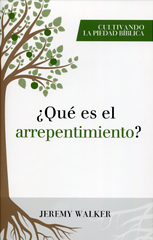 Jeremy Walker
Jeremy Walker
Yesterday evening, I sent out a brief and innocent tweet: “Preaching to an invisible congregation is more exhausting than I thought.” I was surprised by the tide of earnest response that it garnered from tired pastor-preachers.
Why should that be? What can we—pastors and preachers, and congregations—do about it? Answering that question will tell us a lot about our theology of preaching and our theology of the church, for better or for worse.
We must first take account of the limitations of pre-recorded or even livestreamed preaching. Perhaps the best way to communicate this is to give a précis of what I said at the beginning of our video recordings yesterday. It went something like this:
We are grateful to all who are joining us (from our own congregation and others) but we need to issue a necessary reminder.
While some means are better than others, because they have more dimensions of communication, recorded videos, livestreams, and the like are not a substitution for the gathering of the church, but reflect an interruption of it.
Genuine biblical preaching is a living man among living men before the living God: it involves a supernatural reality along appointed channels—both preacher and congregation subject to the immediate operations of the Holy Spirit and both communicating with each another under his influence.
In the absence of a congregation, those dimensions of real preaching are stripped away; the livestream or recording further diminishes that reality because of the extra distancing involved.
We are not, therefore, trying to accomplish what cannot be done. We are not setting out to replicate, by electronic means, the vital spiritual reality of the gathered people of God in the presence of our God under the Word of God.
These efforts are not a replacement for the gathered church but a supplement for the scattered church.
The situation we face keeps us spiritually hungry; this temporary and limited provision stops us spiritually starving.
These scraps will, with the blessing of God, keep you going, but they should also make us long for the restoration of the weekly feast and the laying of the eternal banquet.
That gives something of the backdrop to the challenges we face. Without denying the care of our Heavenly Father, or the goodness of the Good Shepherd, or the might and mercy of the Holy Spirit, the simple fact is that this situation robs us of the normal means and channels by which this act of preaching is normally conducted. That dynamic preaching triangle—in which the Holy Spirit is operating along three planes, involving God and the preacher, God and the congregation, and the preacher and the congregation, each operating upon each other with or under the Spirit’s superintendence—is missing one of its corners.
For the congregation, the mentality of ‘going to worship’ is reduced. Under these lock-down and shut-in circumstances, we are being encouraged to maintain a routine for home-working, to get into the groove of labour despite being not in the normal place of labour. In a similar fashion, getting up, getting ready, and getting out for worship, going to a particular place for that particular activity, helps to put us in mind of what we are about.
Add to that the fact that the congregation is now typically in a different and potentially distracting environment. One of the advantages of Dissenting chapel architecture is its deliberately clean minimalism, removing many of the elements which might otherwise take our hearts off the preaching and hearing of the Word of God. Now, the inventive or unfocused mind will find and have a hundred ways still to do that … the animal outside the window … the number of panels in the ceiling or wall … the play of the sunlight … the preacher’s verbal tic … the agitation of the family with the young children … the reflection of light from a watch face. Been there, done all that! But, the fact remains that many church buildings are uncluttered spaces designed to focus the attention on the preaching. Our homes are not the same. There are all the things that we are accustomed to do, all the things that we would not have to worry or think about if at home. We lack the gracious pressure of a whole congregation helping to establish a reverent and attentive atmosphere. We can get up and brew up, we can pause the preacher, we can relax in our comfortable chair and drift away. There is also the novelty factor, especially for those who have children. The fact that it isn’t ‘church’ can make it harder for our children to adapt.
And then, the preacher himself is not there to engage with them, to pick up on the ebbs and flows of a congregation and its listening. This is no longer a mutually responsive environment. Perhaps they are tuning in to someone else who is not even their pastor and usual preacher, so he is not even preaching with them in mind. The reality of this particular under-shepherd feeding this particular flock which he knows and for which he is, under God, responsible, is gone.
The preacher is, perhaps, aware of much of this. It may be that he has some very similar challenges for himself, for many were attempting broadcasts from a study or living room or kitchen. He is not in his typical environment for preaching. Perhaps he is sitting when usually he is standing, behind a desk when usually behind a pulpit. Distractions which are usually absent (barring those of the congregation!) are now painfully present.
Or perhaps he is preaching from a church building, and he has only before him rows of empty seats (perhaps a few family members), or just a camera (perhaps not even an operator). (Our recording involves a quick jog to press a button and back to the pulpit.) Now he is missing all the cues which, under God, normally stir his soul. The regular rhythms of gathered worship which so often generate spiritual momentum are absent. Worse, there are no people, no faces, no responses. And he is, or should be, conscious that—whether livestreamed or recorded—he has to overcome, under God, some of the congregation’s disadvantages, wherever they may be and under whatever circumstances they might be listening. And so he begins to preach … except it’s barely preaching. His normal thinking and feeling are all undermined by the absence of that natural and spiritual give-and-take which characterises real public ministry. He never was a mere automaton, spouting religious words. He struggles to concentrate, to maintain intensity, he has no external cues for the ebb and flow of the sermon, no external prompts for getting, keeping, or recovering the attention of a body of people. He is not so much leading the flock to the green pastures as pinging vitamin pellets at them with a catapult. Perhaps he is not sure where to look—at the camera, at the seats, out the windows. He does not want merely to read, but he struggles to do more than speak. Everything feels flat, and there is a possibility that he will over-compensate, and try to do what—under the circumstances—is nigh-on impossible to be done, and end up not with a flat mess but with a hot one.
And, then, perhaps worst of all for him, he may have an opportunity down the line to watch or hear a recording of himself, which—as most preachers know—leaves us ready to crawl into a deep dark hole of mourning and regret (or maybe just a real deep, dark hole), taking perpetual vows never to preach again, let alone in front of a camera, for his own sake, and the sake of all whom he loves and whose sanity he cherishes.
And that leaves us with the last point of that dynamic triangle: God. This is a good place to be left! If it were not for our Lord’s blessing upon regular ministry, it would be at least as bad as that usually, if not worse. It is he who, by his Spirit, establishes all those connections and makes them lively with heavenly forcefulness. The usual means he has appointed are no longer in place. The usual channels of blessing are dry or blocked. But, as a well-established Confession of Faith puts it, “God in his ordinary providence makes use of means, but he is free to work without, above, and against them as he pleases.” Praise God that it is so! What we are doing is just not church, and it is not quite preaching, but that does not stop the Lord blessing the usual means under unusual circumstances, using unusual means to usual ends, or even using unusual means to unusual ends. After all, there are many saints in many churches who are genuinely unable to attend regular services, and the Lord in his mercy makes what would normally be limited means sufficient not just to survive but even to thrive. Why should be not be able to do the same, even under these circumstances, for all of us?
With all that in mind, let me offer some practical suggestions. Members of congregations might plan to meet at a regular time (if livestreaming, this may be already in place). Whether individually, or as a family, prepare to be in a certain place at the appointed time, with everything set up and, if possible, tested. Do not go full slob: wash and dress as you would for church. Minimise distractions where possible—no food or drink, silence your phones, do not be preparing a meal or worrying about other responsibilities. Pray before you press play. Focus on the preaching of God’s Word. You may not be worshipping with the church, but you are and still can be worshipping God. Some technologies allow for commenting and interacting. Perhaps it is worth leaving that alone, and focusing on the listening? Pray afterward, alone or with others, for a blessing on what you have heard. Use what technology is available to interact with others afterward: pick up the preaching with family or friends, maybe send the preacher a message of encouragement to remind him that someone human was engaged and engaging. Be thankful to God for the wonderful means that are available for you to obtain something. And do pray for your pastor. He is trying to feed your soul from a distance. He is like a shepherd looking out over distant fields, seeing his sheep from afar, chained up and only able to lob something good in their general direction.
Pastors, too, should perhaps seek to maintain, as much as possible, their usual routines, even if their sermons are necessarily adapted to the present crisis and its particular circumstances. It is no bad thing to wash and dress as if you were ‘going to church.’ If you can, sing and pray, even if alone, so that your soul is stimulated and enlivened by those spiritual exercises. Whether at home or in a church building, it may help not so much to imagine as to visualise the congregation. Remember the faces to which and the lives into which you are normally preaching. In the same way as you normally preach to the people who are or who you wish be be in front of you, and not the people who might listen later, on this occasion speak as if to the people who are normally in front of you, regardless of who might hear it otherwise.Do not so much speak to a camera as through it. You may need to speak more briefly and pointedly, both to help you stay engaged and focused, and to help those hearing or watching to do the same. And then, when you have finished, do what you usually do—go to God with all your failings and feebleness, and ask him to bless what will lie dry and dusty on the surface of the soul without his gracious ploughing to carry it home and his refreshing mercies to cause it to spring up into life. Expect to be drained, perhaps in different ways or in different aspects of your humanity to the usual. Make sure you rest, and think about your labours, and learn how better to communicate truth under these circumstances, for as long as they may last. How thankful we should be that, though we may be physically far from the flock of Christ, we can still bear them up in our hearts, knowing that the Good Shepherd has promised that he will be with them always, even to the end of the age!
When all is said and done, do not expect it to be real church and do not expect it to be real preaching. Even with the blessing of the triune God, it cannot and will not be that. And so, let preacher and hearer alike be stirred up to eager anticipation for the day when we can once again see each other face to face, so that your joy may be full (2Jn 12), and when we—together in the presence of God—hear the word of life once more.
—
From The Wanderer blog by Jeremy Walker. Used with permission.
These books by Jeremy Walker are available at Trinity Book Service:


